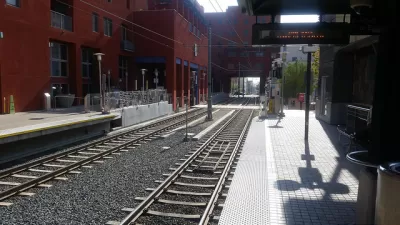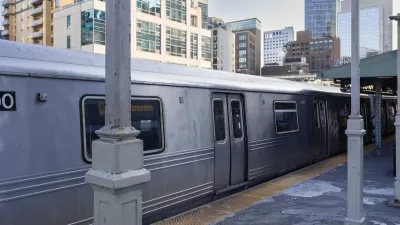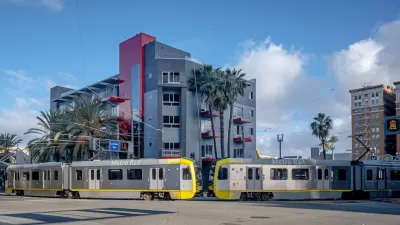Transit providers are often major landowners in their communities, controlling underutilized properties like park-and-ride lots or storage and maintenance facilities. These sites are also opportunities to provide desperately needed affordable housing

Public transit providers are struggling to make ends meet. Many agencies are in a vicious cycle: the increased use of ride-hailing and bike-sharing services means fewer riders, creating a decline in revenue, which, along with the chronic lack of funding, results in further service cuts. It doesn’t help that in many communities, an affordable housing shortage has displaced lower-income riders who typically rely on transit.
Phil Washington of Los Angeles Metro once said, “I don’t want to build new tracks, I want to make sure people can live near our transit.” It is this same spirit that is behind affordable housing advocates finding new allies—in public transit agencies.
Los Angeles’ Metro transit agency is one several around the nation that has focused on transit-oriented development and either partnered with affordable housing developers or promoted affordable housing near its stations. Since 2016, Metro has distributed $9 million in low-interest rate loans for affordable housing on land adjacent to its stations as part of its Joint Development Program. Like other agencies, Metro also has an explicit affordable housing policy, requiring that at least 35 percent of all housing units developed on its properties be set aside for households making less than 60 percent of the area median income, or roughly $56,000 per year. The program has generated more than 700 subsidized affordable units near the agency’s rapidly expanding system, with another 162 affordable units in construction, and almost 600 more in negotiation.
It turns out that transit agencies have a lot to gain from affordable housing. Transit providers are often major landowners in their communities, controlling underutilized properties like park-and-ride lots or leftover pieces of land from the construction of a new project, or storage and maintenance facilities. These sites are also opportunities to provide desperately needed affordable housing, which in turn creates increased ridership from residents and visitors, as well as additional revenue. For instance . . .
FULL STORY: Affordable Housing on Transit Land

Maui's Vacation Rental Debate Turns Ugly
Verbal attacks, misinformation campaigns and fistfights plague a high-stakes debate to convert thousands of vacation rentals into long-term housing.

Planetizen Federal Action Tracker
A weekly monitor of how Trump’s orders and actions are impacting planners and planning in America.

Chicago’s Ghost Rails
Just beneath the surface of the modern city lie the remnants of its expansive early 20th-century streetcar system.

Bend, Oregon Zoning Reforms Prioritize Small-Scale Housing
The city altered its zoning code to allow multi-family housing and eliminated parking mandates citywide.

Amtrak Cutting Jobs, Funding to High-Speed Rail
The agency plans to cut 10 percent of its workforce and has confirmed it will not fund new high-speed rail projects.

LA Denies Basic Services to Unhoused Residents
The city has repeatedly failed to respond to requests for trash pickup at encampment sites, and eliminated a program that provided mobile showers and toilets.
Urban Design for Planners 1: Software Tools
This six-course series explores essential urban design concepts using open source software and equips planners with the tools they need to participate fully in the urban design process.
Planning for Universal Design
Learn the tools for implementing Universal Design in planning regulations.
planning NEXT
Appalachian Highlands Housing Partners
Mpact (founded as Rail~Volution)
City of Camden Redevelopment Agency
City of Astoria
City of Portland
City of Laramie





























